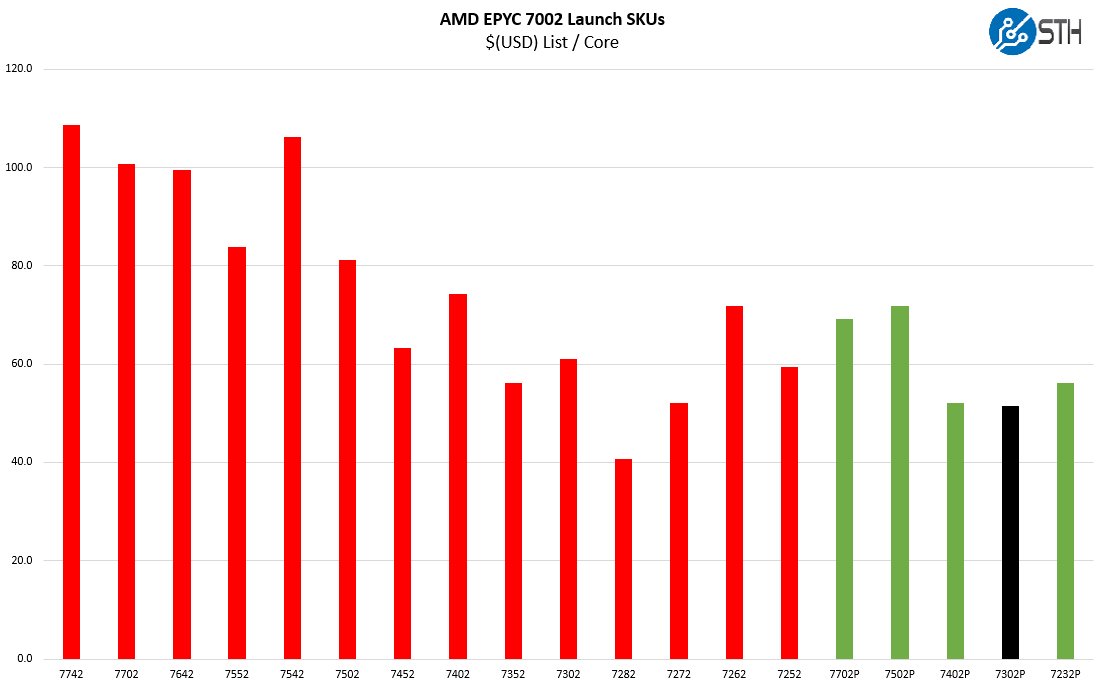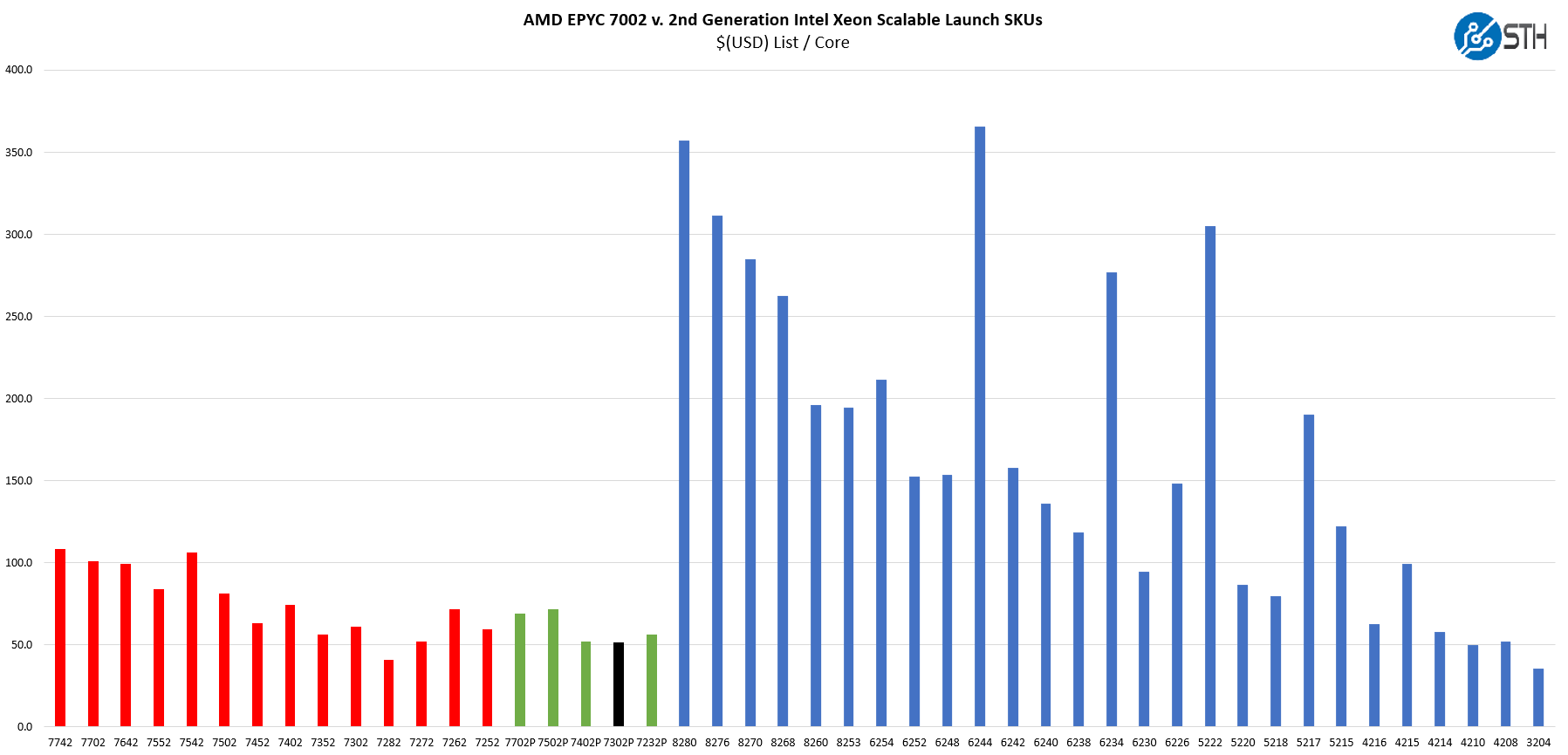AMD EPYC 7302P Market Positioning
Thes chips are not released in a vacuum instead, they have competition on both the Intel and AMD sides. When you purchase a server and select a CPU, it is important to see the value of a platform versus its competitors.
AMD EPYC 7302P v. AMD Alternatives
The AMD EPYC 7302P offers a relatively low cost per core, even for AMD’s lineup as the second-lowest-cost CPU by that metric. Here is a quick chart showing where it falls along the overall AMD EPYC spectrum of cost per core.

With the AMD EPYC 7302P at $825, and the AMD EPYC 7402P at $1250 one is spending around $50/ core either way. If you have the budge, upgrading can make sense.
After using these systems for around two months, perhaps the best guidance we can give for sizing is simply this:
- Use the AMD EPYC 7302P with 8x 16GB DDR4-3200 configurations for 128GB total and 8GB of RAM per core. 8GB RAM per core is similar to what many cloud providers use.
- Use the AMD EPYC 7402P with 8x 32GB DDR4-3200 configurations for 256GB total if you do not need the performance of the 32 core EPYC 7502P which is also costlier per core.
There are many use cases, such as storage servers, that can benefit from the PCIe Gen4 connectivity that the EPYC 7302P has, but do not necessarily need a massive amount of CPU performance. For those, the EPYC 7302P is a great choice. Building a larger (24+ drives) dual Intel Xeon E5 V4 or dual Intel Xeon Silver ZFS storage server would be very difficult in light of the EPYC 7302P’s platform capabilities. AMD still needs its partners to offer more platforms that meet these types of use cases. There are plenty of EPYC 7002 machines that can use external SAS HBAs to makes this a reality already.
AMD EPYC 7302P v. Intel Xeon Alternatives
Taking a step back, the reason the AMD EPYC 7302P is impactful does not come about just because of its value relative to other AMD EPYC CPUs. Instead, look at it compared to Intel Xeon pricing. You can click the below to go to the attachment page.

The AMD EPYC 7302P offers more PCIe expansion and bandwidth than two Intel Xeon Platinum CPUs. It offers performance around an Intel Xeon Gold 6230. From a pricing perspective, it is priced more like an Intel Xeon Silver. It is still considerably faster overall than the Intel Xeon Silver 4214, at a price that is lower per core.
With AMD’s new line, the power consumption is considerably lower to the point where comparisons are very hard. Single CPU to single CPU, the Intel Xeon Silver SKUs use less power. If you start using two CPUs to equal the performance of the AMD EPYC 7302P, the AMD option will be lower and have more expansion capabilities.
If you, for some reason, wanted to use 4TB of RAM with this $825 CPU, you could. That seems like a strange scenario, but if you want over 1TB of memory support you need an Intel “M” series SKU that alone carries a $3000 premium.
Intel does have an advantage, new technologies such as Optane DC Persistent Memory and VNNI. At the $825 price point, Intel does not have a DCPMM SKU. Even the Xeon Gold SKUs that support DCPMM at higher costs are not performance or expansion competitive. Intel also has AVX-512 and VNNI (DL Boost.) If you need either of those technologies, Intel has the CPUs you want. On the other hand, as newer instructions, they are not as well supported as AVX2.
Final Words
While the higher-end chips tend to get a lot more attention for their performance attributes, make no mistake: the AMD EPYC 7302P is an absolutely awesome chip. Cost for the performance we are seeing is at an enormous discount to what Intel offers whether you compare it to dual Intel Xeon Silver chips or single Intel Xeon Gold chips. Let us not forget, one gets more I/O and PCIe Gen4 with the AMD EPYC 7302P which is something that Intel cannot even offer. Instead, Intel’s dual-socket I/O is both less in quantity and half the speed of this $825 AMD part.
AMD’s strategy of moving to high cache chiplets needs some context as well. If you are building an I/O bound system, the EPYC 7002 platform consolidating two to four sockets onto a single socket means a reduction in physical node count or socket-to-socket hops. At this point, if you have a 3-4 node Xeon Silver or Xeon D cluster, you may be better off swapping it out for this part. Once you move chassis-to-chassis hops are measured in milliseconds instead of the nanoseconds measured in a socket.
If you simply want a single node with a low-end CPU in a socket on low-end 1GbE or 10GbE networking with a low-end SATA drive or two, Intel still has several compelling offerings. Once you scale beyond what an Intel Xeon Bronze or low-end Silver has to offer, AMD is providing a better value. Once you move into counting PDU ports, network cables, switch ports, and chassis, the CPU costs become very small.
Perhaps the biggest question now is whether one needs 16 cores with the AMD EPYC 7302P, or if moving down the stack to an 8-core EPYC 7232P or up to a 24-core EPYC 7402P is worthwhile. For many of our readers, this is a great chip to start with and it will pair very nicely with Microsoft Windows Server 2019 Standard’s license.




I’ve been looking into this processor for my home server. I’ve been wanting to upgrade the Xeon 1245-V5 (skylake based LGA 1150 4 core 8 thread CPU) I’ve currently have, because I’m actually hitting a core limit with the VMs I wanna spin up.
My question, what ATX form factor motherboard would work best with this CPU? I have a standard ATX Mid tower case for that server PC, so I can’t go too much bigger than that…
Great article!
This is likely my next processor for my home AIO ZFS server. Just waiting on ATX/E-ATX motherboards that support PCI-E 4.0
Gigabyte MZ32-AR0 (rev. 1.0) supports PCIe 4.0
For home servers where density is not a concern, the EPYC 7282 offers even better perf/$, plus you can run it in dual-socket configurations.
MZ32-AR0 is E-ATX, no? So the only ATX options currently are Supermicro H11SSL and ASRock Rack EPYCD8.
Supermicro Rome mobos are still 1-2 months away:
https://forums.servethehome.com/index.php?threads/any-new-supermicro-motherboard-on-the-pipe-for-epyc-rome.25430/page-4#post-238228
Where can I buy a motherboard that supports Epyc Rome and 3200 speed DDR4?
@Daniel Gigabyte: https://www.gigabyte.com/Server-Motherboard/MZ01-CE1-rev-2x#ov there’s a review here, (of a previous rev.?): https://www.servethehome.com/gigabyte-mz01-ce1-review-an-amd-epyc-atx-gpu-motherboard/